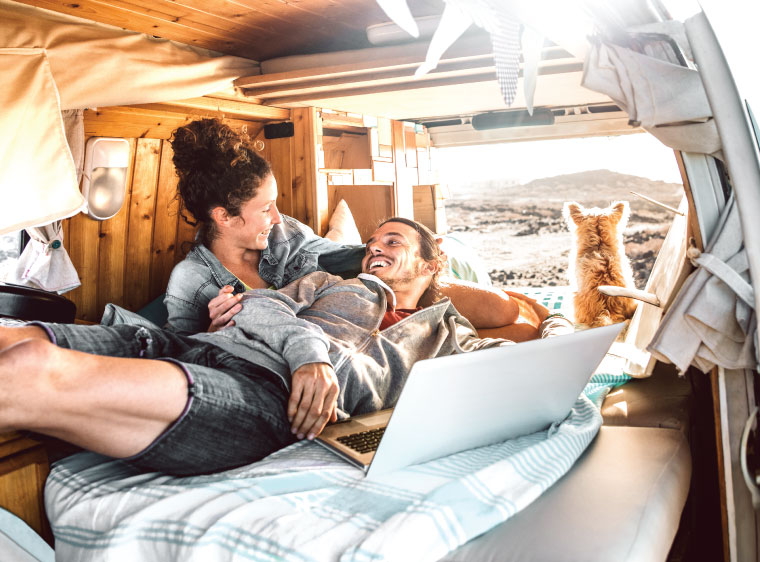Have you ever considered selling your home and most of your possessions, buying a recreational vehicle (RV) and hitting the open road to explore all this country has to offer? If that sounds like a dream to you, you are not alone. With the recent rise in remote work opportunities and the ability to stay connected wherever you are, more and more people are choosing a nomadic lifestyle.
While this approach to life is freeing in many ways, there are also some important financial challenges and considerations you will need to remain on top of.
#1 – Budgeting
Establishing a budget can be challenging when you are constantly moving from place to place. Take time to estimate your expenses and set a realistic budget to help guide your spending. Consider the following costs:
- Travel expenses – Gas, auto payments, insurance, car rentals, airfare
- Lodging expenses – RV park costs, hotels, short-term rentals
- Insurance – Life, health, auto, travel
- Work-related expenses – Internet, software, computers
- Food – Eating out and groceries
- Recreation and entertainment
#2 – Legal residence
As a full-time RVer, you will still need to establish residency somewhere in order to register your vehicle, vote, file taxes, maintain a driver’s license, obtain health insurance, etc. Many domestic nomads choose to establish residency in a state with no income tax, such as Alaska, Florida, Nevada, South Dakota, Tennessee, Texas, Washington or Wyoming.
To establish legal residence in a new state, you will likely need to take the following actions:
- Get a driver’s license.
- Register and insure your vehicle.
- Purchase a health insurance policy in that state.
- Register to vote.
Certain states also require that new residents file an affidavit of domicile with the court to document their intent. Each state has very specific rules regarding residency for income tax purposes, so if you
intend to change your state of residence or domicile, you should consult with your tax advisor about the appropriate steps that you will need to take.
You will want to establish a way to receive mail while you are on the road. One option is to sign up for a forwarding mail service. Doing so provides you with a physical address that will receive all mail while you are traveling. The service will hold your mail at that address until you provide instructions to forward it to an address of your choice.
#3 – Banking
It is important to maintain access to your bank accounts while you are traveling. Look for a bank that offers convenient options, such as online banking and mobile check deposits. You will probably need to withdraw cash at some point, so it may make sense to switch to a national bank that has locations across the country. Or, make sure your local bank or credit union offers free transactions at other banks’ ATMs.
An alternative to traditional banking would be to utilize your investment custodian. Ease of access to checking and banking features through custodial platforms has become a common feature among many of the large providers. An advantage to this approach would be that you can manage all your banking and investments from a single website or mobile app.
#4 – Insurance
A nomadic lifestyle can present insurance challenges, especially if you carry most of your possessions with you in your RV. Your financial advisor can help you identify a range of policies to meet your specific needs, which may include a combination of the following:
- Health insurance
- Auto insurance
- Life insurance
- Travel insurance
- Personal liability insurance
- Personal property insurance
- Umbrella insurance
- Long-term care insurance
#5 – Investments
If funding your nomadic lifestyle requires you to liquidate assets, such as your home, your furniture and most of your possessions, you may find yourself with significant assets. It is important to continue growing your wealth while also having enough liquid assets on hand to fund your lifestyle needs.
Based on your specific situation and goals for the future, it may make sense to maintain five to seven years of living expenses in a fixed income portfolio while investing the rest of your assets in a diversified investment portfolio designed for long-term growth. The benefit of this approach is that you will not need to worry about the impact of market volatility on your short-term assets, but you can continue to access growth potential in your long-term investment portfolio.
#6 – Estate planning
Before you hit the open road, make sure your family is protected should something unexpected happen to you. Your current estate plan may not adequately address your new lifestyle, which is why it is important to conduct a thorough review of any existing documents, such as your will, trusts, powers of attorney, healthcare directives, etc.
It is also important to make sure your family members know where to find your estate planning documents in case of an emergency. Consider having copies with you as you travel, and provide additional copies to trusted family members who will be authorized to act on your behalf.
At United Capital, we have helped multiple families prepare for life as U.S. nomads. If you could use some help preparing your finances for life on the open road, we would love to have a conversation. To learn more, please contact us.




